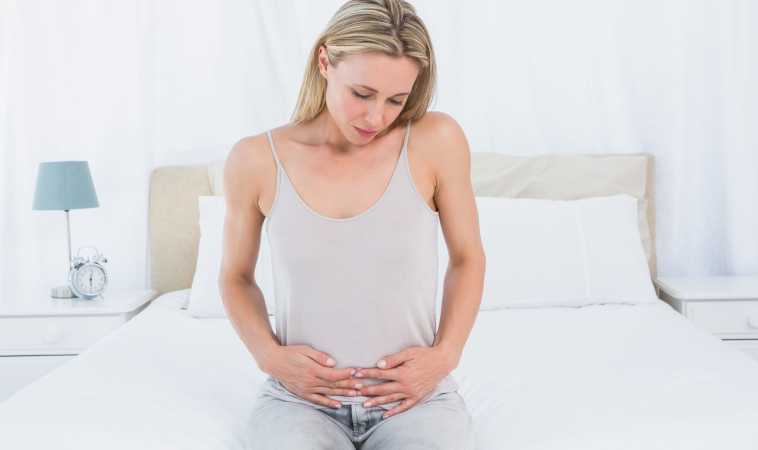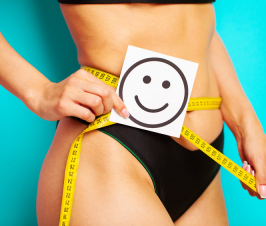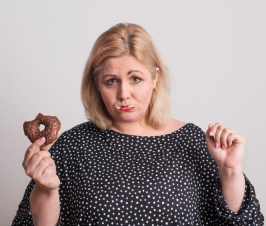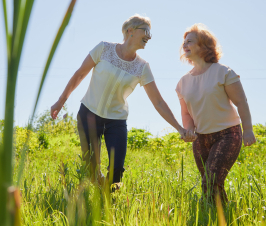How awful does it feel to be bloated, swollen, puffy, and uncomfortable 1-2 weeks per month? A lot of women describe feeling this way at some point before their period comes; one source quoting over 50% of PMS sufferers1. Water retention can affect the face, hands, lower legs, and abdomen. Some women even notice that they regularly gain 4-5 lbs during this time before their period. Many women already try reducing sodium intake during this time, or note that they already have a great whole foods diet. So what gives?
Imbalances That Cause Water Retention
From a traditional Chinese Medicine perspective, the spleen and kidneys may be deficient, and qi (life force) may be stagnant2. The spleen is responsible for transforming and transporting foods and fluid and the kidneys for water metabolism and fluid excretion. Qi is our life force and can become blocked. Causes of these imbalances that lead to water retention include excessive physical work and emotional stress3.
Hormonal imbalances such as elevated estrogen, aldosterone, insulin, and prolactin can cause water retention along with an underactive thyroid and low dopamine4. There are many causes for these imbalances, including stress, sugar intake, nutrient deficiencies, poor liver detoxification due to diet, stress, pharmaceuticals and candida, to list some.
Dietary Factors That Cause Water Retention
Processed foods offer less vitamins, minerals, anti-oxidants, and fiber than whole foods. Even when synthetic vitamins are added in, nothing beats the real food source. Stress will cause the body to become deficient in certain nutrients, because the body uses more during the stress response. Pharmaceuticals like the birth control pill will cause deficiencies as well, along with blockages in absorption such as low hydrochloric acid and bile production, and candida. Deficiencies of calcium, magnesium, B6 and vitamin E can contribute to water retention5.
Treatments
- If you are currently experiencingstress, or have a physically or emotionally demanding lifestyle, stress reduction techniques are very important. Emotional stress is often the root cause of hormonal imbalances, and as noted from the Chinese perspective, may be a contributing factor of water retention. Techniques such as slow, long deep breathing, yoga, and meditation help to decrease stress, improve liver detoxification, and balance hormones.
- Iodine – if you have an underactive thyroid causing water retention, supplementing with iodine may be helpful, or making sure to eat seaweeds. 2 tbsp of dulse can be easily added to soups.
- Liver support – non-alcoholic fatty liver disease is on the rise, and is the most common liver disorder in the west6. Many people have it, and don’t even know it. Supporting the liver with a vitamin B complex, N-acetylcysteine, and herbs such as Rosemary encourage liver detoxification. The B complex and the herb Rosemary also help to metabolize estrogen. A diet free of sugar, poor quality dairy, wheat, alcohol, and caffeine will help the liver do its job better.
- Food – 4 fruits and 4 veggies per day, organic if possible. Whole grains – barley, rice, quinoa, buckwheat. Fats – extra virgin olive oil, organic flaxseed oil, and pure fish oil. 2 litres of pure water daily, seaweeds, minimize animal meats and use organic tofu, nuts, and seeds as protein.
- Acupuncture – acupuncture will strengthen your body’s innate capacity to correct the imbalances in the spleen, kidneys, and qi. For example, there are acupuncture points that “promote the transformation, transportation and excretion of fluids to resolve edema”7. And, the stress response is modified with acupuncture. For example, there is an acupuncture point that “moves Qi, pacifies the liver, and calms the mind8. Incorporating acupuncture and Chinese herbs into a treatment plan will help with a speedier resolution to water retention.
If you experience bloating before your period, work with your naturopathic doctor to resolve the underlying reasons. Both the Chinese and western causes of water retention include imbalances in the body that when resolved, promote a feeling of wellness, balance, and an experience of ‘fitting in your skin’.
 After graduating from the University of Toronto with an Honours Bachelor of Arts degree, Dr. Donata Girolamo then pursued her passion for holistic medicine at the Canadian College of Naturopathic Medicine in Toronto, becoming a licensed and registered Naturopathic Doctor.
After graduating from the University of Toronto with an Honours Bachelor of Arts degree, Dr. Donata Girolamo then pursued her passion for holistic medicine at the Canadian College of Naturopathic Medicine in Toronto, becoming a licensed and registered Naturopathic Doctor.
Dr. Donata Girolamo maintains a private family practice with special interests in fertility and mental wellness. Her mission is to optimize your health care by combining evidence-based medicine with the art and wisdom of traditional medicine. To address your health concerns she uses acupuncture, herbs, homeopathy, nutrition and lifestyle counseling.
She maintains inspired through continuing education, and has extensive training in homeopathy, biotherapeutic drainage, auricular medicine, and medical intuition. She has additional certification in Wilson’s Temperature Syndrome, First Line Therapy; a lifestyle program for weight loss and chronic disease prevention and treatment, and Psychosomatic Energetics. Due to her interest in the link between mind, body and spirit, Dr. Girolamo has taken intensive courses in Vipassana and Mindfulness meditation, and mind-body medicine through The Benson-Henry Institute for Mind-Body medicine.
She is certified by the Board of Directors of Drugless Therapy Naturopathy and an active member of The Ontario Association of Naturopathic Doctors, the Canadian Association of Naturopathic Doctors, and the Association of Perinatal Naturopathic Doctors. She is a regular contributor to Health Wellness and Safety magazine, and has written for Canadian Health and Lifestyle. She is a guest speaker at Niagara College, teaching stress management with meditation, and is active in the community, giving health talks to groups like Run Girl Run, Happy Hearts, Niagara Pain Program, and Form Fitness. She is appearing in a fertility segment on CHCH news, and has been interviewed on 610 CKTB newstalk radio regarding menopause. Understanding and sharing the body’s wisdom is not only a passion, but her calling.
References:
- Kaur, SD, Dean, C, Danylak-Arhanic, M. The complete natural medicine guide to women’s health. Toronto: R. Rose; 2005.
- Maciocia, G. Obstetrics and gynecology in Chinese medicine. New York: Churchill Livingstone; 1998.
- Maciocia, G. Obstetrics and gynecology in Chinese medicine. New York: Churchill Livingstone; 1998.
- Kaur, SD, Dean, C, Danylak-Arhanic, M. The complete natural medicine guide to women’s health. Toronto: R. Rose; 2005.
- Kaur, SD, Dean, C, Danylak-Arhanic, M. The complete natural medicine guide to women’s health. Toronto: R. Rose; 2005.
- Watner, J, Martin, LJ. Non-Alcoholic Fatty Liver Disease Rates Rising in U.S. WebMD. Available at: http://www.webmd.com/diet/20110402/non-alcoholic-fatty-liver-disease-rates-rising-in-us. Accessed February 13, 2016.
- Maciocia, G. Obstetrics and gynecology in Chinese medicine. New York: Churchill Livingstone; 1998.
- Maciocia, G. Obstetrics and gynecology in Chinese medicine. New York: Churchill Livingstone; 1998.

















